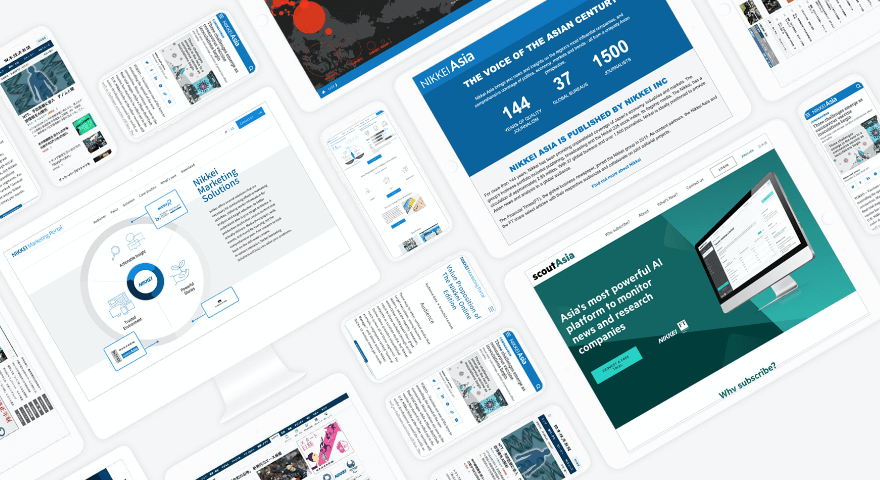- History
Our History 3: The Birth of the Nikkei

On March 1, 1946, the newspaper known during wartime as Nihon Sangyo Keizai changed its name to Nihon Keizai Shimbun. The paper had produced a total of 21,630 issues since its earlier incarnation under a different name. On the 13th of the same month, the company name was also changed to Nihon Keizai Shimbunsha, and a new title was inscribed by the calligrapher Soukyu Ueda. The next year, on April 10, 1947, at the suggestion of President Toshie Obama, who had given the company its new name, the following corporate philosophy was adopted: "Contribute to the peaceful and democratic development of the Japanese economy, the basis of people's livelihoods, by providing fair and impartial news." Under this new slogan, the story that has led to today's Nikkei began. (Excerpts from pages 155-157 of The 100-year History of the Nikkei)
Nihon Keizai Shimbun
The Nikkei became assumed its current title in Japanese, Nihon Keizai Shimbun, on March 1, 1946. Not long thereafter, on March 13, 1946, the company name was also changed, to Nihon Keizai Shimbunsha.
During the wartime era, the newspaper's name had been Nihon Sangyo Keizai Shimbun, and the company was called Nihon Sangyo Keizai Shimbunsha. In 1942, amidst a wartime shortage of goods, the government authorities had ordered the Chugai Shogyo Shimpo, Nikkan Kogyo, Keizai Jiji Shimpo and other economic newspapers to merge. As a condition of this merger, the government mandated a revised title for the resulting paper.
Toshie Obama, who was the chief editor of the Chugai Shogyo Shimpo at the time, proposed the name Nihon Keizai Shimbun, but the authorities insisted on using a title in accord with the merger order, which was intended "to create a new industrial economic newspaper." Thus, the name Nihon Sangyo Keizai was adopted.
After the war had ended, it was suggested within the company that the name that had been forcibly given by the government be changed, and "Nihon Keizai Shimbun," which President Obama had initially devised, was selected as the replacement. The official title was written out by Soukyu Ueda, an up-and-coming calligrapher at the time.
Journalist Toshie Obama
In 1947, at the suggestion of President Obama, the company's motto was formulated as: "Contribute to the peaceful and democratic development of the Japanese economy, the basis of people's livelihoods, by providing fair and impartial news." This was adopted as representative of the editorial creed, and these words reflected Obama's pride as a journalist.
"Fair and Impartial" Corporate Philosophy and Nikkei's Reporting
In the days before the end of the Second World War, the majority of those in the press and the financial community supported the government's policy, and there were few who opposed its ideas regarding the gold embargo. This latter group included Obama and Tanzan Ishibashi, the chief editor of the Toyo Keizai Shimpo. Despite the tenor of the times, they remained unyielding in their views.
Obama later said, "Neither Japanese university economists nor those in the business community understood what it would mean to lift the gold embargo...If one raises the value of money, prices will go down, but the implications for the business world were generally unknown." (Testimony: My Showa History).
Even during the war, when Obama was editor-in-chief, he did not hesitate to publish articles criticizing the military, and he was often summoned to appear before military authorities. He firmly opposed the National Mobilization Law, which gave the government the authority to suspend the publication of newspapers for national defense purposes, and he also stood against the Japan-Germany-Italy Axis.
The postwar guiding principle of Nikkei's journalism has remained in force down to the present day. It embodies the spirit of observing matters from an economic standpoint and reporting on them in a "fair and impartial" manner. This means that the paper operates without depending on any particular ideology or position and without being beholden to any given authority.
Nikkei Inc.

Our mission is to deliver useful information to businesspeople around the world through our global products. We use our extensive network in Asia to conduct in-depth research on fast-growing markets and companies. By bringing you unique perspectives and the latest economic and political news, we help you succeed in your business in Asia.
See More
